Washington, we have a problem!
Public opinion has become so heated over recent issues, that many Americans have been making angry statements – and making fools of themselves – over individual rights, what government can or can’t do, and basically speaking without remembering the meanings of terms they should have learned in school.
Americans are already so polarized about important issues that it doesn’t help – and is a waste of time – arguing over minutia. What is the matter with us?
A FRAME OF REFERENCE
Truth and fact exist based on the best information science and technology can determine at the moment and on the acceptance of those truths and facts by the vast majority of scientists, researchers, historians, scholars, and others intimately familiar with the subject. Some facts may never change, such as the number of bones in a human body which probably hasn’t changed for thousands of years now, but many others, over time, may be altered by new information and evolution itself.
In 500 BC the Greeks believed the earth was a sphere, then later between about 500 to 1100 AD, give or take a few years, it was a fact that the world was flat. Alas, the real fact is, in 2021 we know the earth is neither flat nor is it completely spherical.*
This is the Frame of Reference for discussing Democracy v Republic in terms of form of government.
Within our frame of reference, it is clear the founding fathers favored a republic rather than a democracy as those terms were then defined. They wanted a government for the people and by the people, and championed seating power in the people of the nation. They also feared what they called the "tyranny of the majority", where the minorities have no protection of their rights.
Their solution was the creation of a republic where the people elect representatives to conduct the business of government, but with a Constitution that addresses this concern spelling out the rights of individuals, is intended to prevent the majoritarian rule of a simple democracy.
When the delegates of the United States Constitutional Convention debated the question in 1787, the exact meanings of the terms republic and democracy remained unsettled. At the time, there was no term for a representative form of government created “by the people” rather than by a king.
However, these guys were pretty smart!
They conceived a new form of government with "liberty and justice for all" based on the concept of the power resting with the citizens. These citizens elect representatives to make the laws which must be consistent with a Constitution that spells out the rights of all the citizens. There were plenty of disagreements and other major issues – such as a strong federal government v power being vested in the states – which are related to but not part of the democracy v republic question.
Our Constitution was designed to “promote the general Welfare and secure the Blessings of Liberty.” With these rights and blessings come responsibilities that citizens need to assume in order to fulfill the promise of the new nation. These lofty goals and principles never had a singular interpretation and over time have led to differing ideas and heated debates, but none of them negate the responsibilities of the citizens, which many fail to mention when talking about their rights.
Original painting by Junius Brutus Stearns - Photographer: Granger
Source of Image with caption: pagetwo.completecolorado.com/
Keep in mind that the Roman Republic conquered much of Europe and East Asia, and with the Romans came their traditions and ideas, including that of republics. The founding fathers had examples of different forms of republics in Europe to learn from.
THE DIFFERENCE BETWEEN A DEMOCRACY AND A REPUBLIC
Democracy and Republic are often taken as one in the same, but there is a fundamental difference.
First, there are different kinds of democracies and republics, and they can ‒ can be and are ‒ mixed and matched into hybrid forms of governance. Second, both in republics and democracies, citizens can be empowered to participate by electing representatives to the governing bodies. These representatives are sworn to protect the interests of their electorate.
Democracies
A pure democracy – called a simple or Athenian Democracy -- requires the people be allowed to take part in the government and its political processes. In a pure democracy, all citizens who are eligible to vote take an equal part in the process of making laws that govern them.
In other words, all citizens vote on all laws and measures, and the majority rules.
Because of the size of the territory included in the newborn country, from the beginning the Founding Fathers realized they needed a representative form of governance where citizens vote directly for representative who then convene to vote on the laws.
Even with a democracy with a representative system, the essence of the system is “The majority rules”. The attitude toward law is that the will of the majority shall regulate. whether it be based upon deliberation or governed by passion, prejudice, and impulse, without restraint or regard to consequences. Therefore, in a democracy minority rights are overridden by the majority, and the laws enacted by the majority apply to all citizens of the country.
This is probably the most significant difference between the two forms of governance, because it leaves those in the minority with no protections of their personal or property rights.
Republics
The basic concept of a republic is a form of governance wherein the power rests in the hands of the citizens who elect representatives to make the laws and an executive to enforce those laws. Election of those representatives is through a voting process open to all citizens eligible to vote. Government leaders exercise their powers as per the rule of law, not rule of the majority as in a simple democracy.
A constitution, which is the law, limits the power of Government and ensures some rights and protections which cannot be overridden even by the majority. According to the constitution those individual and property rights are guaranteed and the government is prohibited from limiting or taking away certain “inalienable” rights of the people, even if that government was freely chosen by a majority of the people.
In a pure democracy, the voting majority has almost limitless power over the minority. Inherent in this is the expectation that to enjoy the guaranteed rights the citizens will accept the obligation and responsibility to participate in the voting process and to obey the laws.
The following chart, put together from two sources, compares a pure democracy and a republic and lays out the major differences.
After all this time, there is still no “official” designation for the type of governance we enjoy in the United States. Like most modern nations, is neither a pure republic nor a pure democracy. Instead, it is a hybrid democratic republic.
Alexander Hamilton called it a “representative democracy.” Others called it a “representative democratic republic”. It definitely combines several forms of government.
Just remember, you “pledge allegiance to the flag of the United States of America and to the republic for which it stands."
Because our country is a “representative democratic republic” which honors freedom and liberty and has guaranteed your right to speak out, it’s okay to have issues with the government, and it’s okay to disagree with something you don’t believe in… but please, do so from an informed position. And remember the responsibilities of the citizen in all this.
Try reading the Constitution, or a minimum the Bill of Rights, before you write that nasty little comment on FaceBook or Twitter.
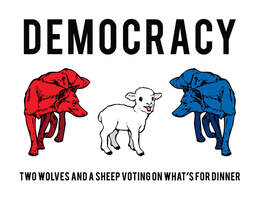
The saying means that in a pure democracy, the majority would literally eat the minority for lunch or dinner. The closest Franklin comes to expressing this sentiment is where he writes in a 1773 letter, “There is Truth in the Old Saying, That if you make yourself a Sheep, the Wolves will eat you.”
The first documented printing of the statement that has been found is the journal “Nomoss: Studies in Spontaneous Order" in 1987. Authorship is unknown. For your amusement, here are a few other definitions by Bill K. published on groups.google.com/g/misc.activism.militia/:
“A Democracy: Three wolves and a sheep voting on dinner.”
“A Republic: The flock gets to vote for which wolves vote on dinner.”
“A Constitutional Republic: Voting on dinner is expressly forbidden, and the sheep are armed.”
“Federal Government: The means by which the sheep will be fooled into voting for a Democracy…”
“Democrats and Republicans: sheep who think they are wolves.”
JUST SAYIN
□
THE BILL OF RIGHTS FROM THE UNITED STATES CONSTITUTION
Article VII
The Ratification of the Conventions of nine States, shall be sufficient for the Establishment of this Constitution between the States so ratifying the Same.
First Amendment
Congress shall make no law respecting an establishment of religion, or prohibiting the free exercise thereof; or abridging the freedom of speech, or of the press; or the right of the people peaceably to assemble, and to petition the Government for a redress of grievances.
Second Amendment
A well regulated Militia, being necessary to the security of a free State, the right of the people to keep and bear Arms, shall not be infringed.
Third Amendment
No Soldier shall, in time of peace be quartered in any house, without the consent of the Owner, nor in time of war, but in a manner to be prescribed by law.
Fourth Amendment
The right of the people to be secure in their persons, houses, papers, and effects, against unreasonable searches and seizures, shall not be violated, and no Warrants shall issue, but upon probable cause, supported by Oath or affirmation, and particularly describing the place to be searched, and the persons or things to be seized.
Fifth Amendment
No person shall be held to answer for a capital, or otherwise infamous crime, unless on a presentment or indictment of a Grand Jury, except in cases arising in the land or naval forces, or in the Militia, when in actual service in time of War or public danger; nor shall any person be subject for the same offence to be twice put in jeopardy of life or limb; nor shall be compelled in any criminal case to be a witness against himself, nor be deprived of life, liberty, or property, without due process of law; nor shall private property be taken for public use, without just compensation.
Sixth Amendment
In all criminal prosecutions, the accused shall enjoy the right to a speedy and public trial, by an impartial jury of the State and district wherein the crime shall have been committed, which district shall have been previously ascertained by law, and to be informed of the nature and cause of the accusation; to be confronted with the witnesses against him; to have compulsory process for obtaining witnesses in his favor, and to have the Assistance of Counsel for his defense.
Seventh Amendment
In Suits at common law, where the value in controversy shall exceed twenty dollars, the right of trial by jury shall be preserved, and no fact tried by a jury, shall be otherwise reexamined in any Court of the United States, than according to the rules of the common law.
Eighth Amendment
Excessive bail shall not be required, nor excessive fines imposed, nor cruel and unusual punishments inflicted.
Ninth Amendment
The enumeration in the Constitution, of certain rights, shall not be construed to deny or disparage others retained by the people.
10th Amendment
The powers not delegated to the United States by the Constitution, nor prohibited by it to the States, are reserved to the States respectively, or to the people.
□
Notes
Note 1: Thirty-three amendments to the United States Constitution have been proposed by the United States Congress and sent to the states for ratification since the Constitution was put into operation on March 4, 1789. Twenty-seven of these, have been ratified.
Note 2:: The earth is not a perfect oblate spheroid, because mass is distributed unevenly within the planet. There is more mass in the southern hemisphere. The greater the concentration of mass is, the stronger its gravitational pull, creating bumps around the globe. Moreover, to even out Earth's imbalanced distribution of mass and stabilize its spin, the entire surface of the Earth will rotate and try to redistribute mass along the equator, a process called true polar wander.
Sources
https://www.theunion.com/news/twi/our-founding-fathers-wanted-a-republic-not-a-democracy/
https://www.intellectualtakeout.org/article/us-democratic-constitutional-republic-and-yes-it-matters/
https://www.thoughtco.com/republic-vs-democracy-4169936
https://joedoakesplace.blogspot.com/2015/04/democracy-versus-republic.html
https://juscafe.com/encyclopedia/the-bill-of-rights-1791-the-usa/
https://checkyourfact.com/2019/05/29/fact-check-democracy-jefferson-adams-franklin-hamilton/
https://ammo.com/articles/founding-fathers-quotes-democracy-government-power-in-people
http://www.u-s-history.com/pages/h375.html
https://americanhistory.si.edu/democracy-exhibition/creating-citizens/what-are-rights-and-responsibilities-citizens
https://pagetwo.completecolorado.com/2020/12/23/caldara-dont-forfeit-freedoms-to-fear/
https://www.history.com/news/biracial-royalty-meghan-markle-queen-charlotte#:~:text=Black%20royalty%20has%20always%20existed%2C%20and%20modern%20monarchies,have%20complicated%20contemporary%20de
https://en.wikipedia.org/wiki/Democratic_republic#:~:text=Republic%3A%20%22A%20state%20in%20which%20supreme%20power%20is,members%20of%20a%20state%2C%20typically%20through%20elected%20representatives.%22
https://www.barrypopik.com/index.php/new_york_city/entry/democracy_is_two_wolves/#:~:text=%22Democracy%20is%20two%20wolves%20and%20a%20lamb%2Fsheep%20voting,majority%20would%20literally%20eat%20the%20minority%20for%20lunch%2Fdinner.
https://keydifferences.com/difference-between-democracy-and-republic.html#:~:text=The%20major%20differences%20between%20democracy%20and%20republic%20are,rule%20of%20the%20people%E2%80%99.%20...%20More%20items...%20
https://www.ourdocuments.gov/print_friendly.php?flash=false&page=transcript&doc=13&title=Transcript+of+Bill+of+Rights+(1791)
https://byjus.com/free-ias-prep/difference-between-democracy-and-republic/#:~:text=Difference%20between%20Democracy%20and%20Republic%20%20%20Democracy,made%20by%20...%20%204%20more%20rows%20
https://constitutioncenter.org/interactive-constitution/full-text#:~:text=Full%20%EE%80%80Text%EE%80%81%20The%20%EE%80%80U.S%EE%80%81.%20%EE%80%80Constitution%EE%80%81.%20We%20the%20People,and%20establish%20this%20%EE%80%80Constitution%EE%80%81%20for%20the
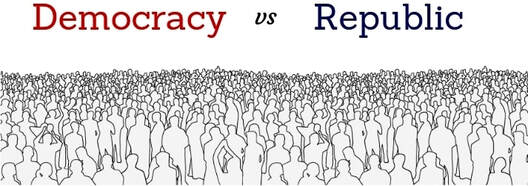


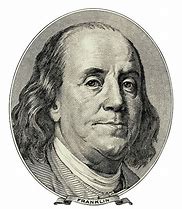





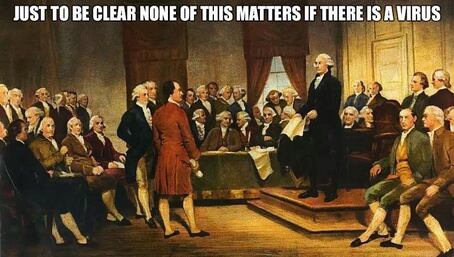
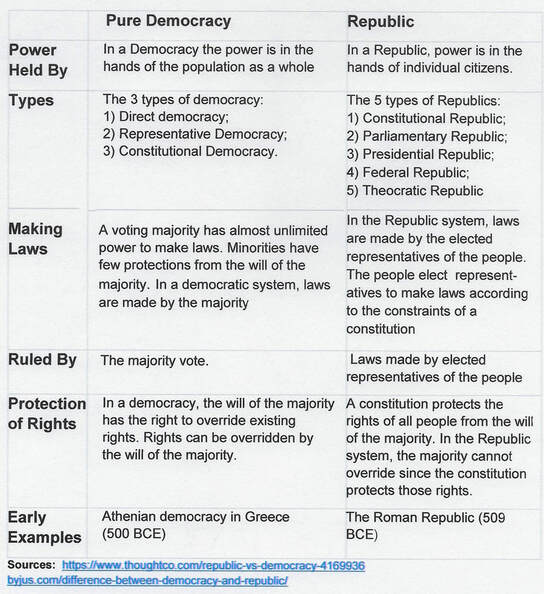
 RSS Feed
RSS Feed